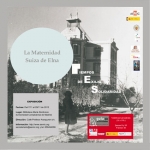Usable Pasts and Futurities: The Changing Place of Europe in Global Memory Cultures
CALL FOR PAPERS
Usable Pasts and Futurities: The Changing Place of Europe in Global Memory Cultures
Date: May 22-23, 2014
Place: Toronto, ON, Canada
Deadline: 18 December 2013
CALL FOR PAPERS
Usable Pasts and Futurities: The Changing Place of Europe in Global Memory Cultures
Date: May 22-23, 2014
Place: Toronto, ON, Canada
Deadline: 18 December 2013
Andreas Huyssen’s observation of a «memory boom of unprecedented proportions» in the post-wall era has not lost its pertinence today; on the contrary, the 21st century continues to be marked by a preoccupation with discourses surrounding memory in the academic, political, cultural and public spheres. This is most certainly the case in Europe, where efforts to foster a greater sense of purpose for the project of European integration are often accompanied by a turn to memory and commemorative practices. For example, a 2009 European Parliament resolution on European conscience and totalitarianism states that «Europe will not be united unless it is able to form a common view of its history» and holds that «appropriate preservation of historical memory, a comprehensive reassessment of European history and Europe-wide recognition of all historical aspects of modern Europe will strengthen European integration». Tony Judt therefore has gone so far as to suggest that memory has become a definitional narrative, the ‘common currency’, of the EU project.
Alongside such institutional calls for a common European memory, academic memory studies have stressed the need to consider the transnational dimensions of cultural memory. As the nation loses its credence as the sole framework for collective memory and identity in this latest phase of globalization, mass migration and new media, scholars have drawn increasing attention to the ways in which memories operate multidirectionally (Rothberg) within as well as outside of and between nations. This conference seeks to take stock of such transnational dimensions of European memory by investigating not only how memory discourses circulate on intra-European, but also on extra-European levels. We seek proposals for 20-minute presentations that consider how memories of ‘Europe’ are being transferred, translated, and/or transformed through global interactions.
Questions to be addressed might include:
• How are cultural memories related to ‘Europe’ being shaped and mobilized in the 21st century?
• How have supra-national memories relating to wars, genocide, colonialism, communism, migration or expulsion been cast as central to, or divisive of, the European imaginary of the present moment?
• How are memories beyond those mandated by European institutions being forged either within or beyond the boundaries of Europe?
• How are contemporary artists, writers, filmmakers, and other cultural agents exploring the transnational dimensions of European memory?
• How have networks of transnational memory become a platform for future solidarity and/or activism?
• Are there alternative (potentially more positive) narratives that can be added to what Claus Leggewie calls the ‘negative foundational myths’ of Europe?
The conference is meant to serve as a venue at which to discuss papers to be reworked and expanded for inclusion in an edited volume. We are aiming to submit a collection of selected, article-length papers by Spring 2015.
Funding applications are still pending, but the organizers are making every effort to secure partial support for participants’ travel expenses. Participants are encouraged to seek funding from other sources in the meantime.
Please submit your abstracts (500 words maximum) as well as a short CV (academic background and relevant publications) by December 18th, 2013 to Dr. Christina Kraenzle kraenzle@yorku.ca and Dr. Maria Mayr mmayr@mun.ca.

